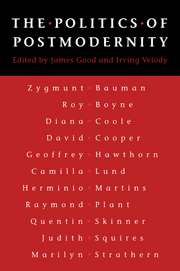Book contents
- Frontmatter
- Contents
- Acknowledgements
- Notes on contributors
- 1 Introduction: postmodernity and the political
- Part I Modernity and its vicissitudes
- 2 Parvenu and pariah: heroes and victims of modernity
- 3 Private and public in ‘late-modern’ democracy
- 4 Modernity and disenchantment: some reflections on Charles Taylor's diagnosis
- 5 Postmodernism and ‘the end of philosophy’
- Part II The critique of modernist political thought
- Part III Technology and the politics of culture
- Index
2 - Parvenu and pariah: heroes and victims of modernity
Published online by Cambridge University Press: 05 June 2012
- Frontmatter
- Contents
- Acknowledgements
- Notes on contributors
- 1 Introduction: postmodernity and the political
- Part I Modernity and its vicissitudes
- 2 Parvenu and pariah: heroes and victims of modernity
- 3 Private and public in ‘late-modern’ democracy
- 4 Modernity and disenchantment: some reflections on Charles Taylor's diagnosis
- 5 Postmodernism and ‘the end of philosophy’
- Part II The critique of modernist political thought
- Part III Technology and the politics of culture
- Index
Summary
Socially, modernity is about standards, hope and guilt. Standards – beckoning, alluring, or prodding; but always stretching, always a step or two ahead of the pursuers, always forging onward just a little bit quicker than their chasers. And always promising that the morrow will be better than the now. And always keeping the promise fresh and unsullied, since the morrow will forever be a day after. And always mixing the hope of reaching the promised land with the guilt of not walking fast enough. The guilt protects the hope from frustration; the hope sees to it that the guilt never dries up. ‘L'homme est coupable’ – observed Camus, that watchful correspondent from the land of modernity – ‘mais il l'est de n'avoir su tirer de lui-même.’
Psychically, modernity is about identity: about the truth of being as not-yet-here, as a task, a mission, a responsibility. Like the rest of standards, identity stays stubbornly ahead: one needs to run breathlessly to reach it. And so one runs, pulled by hope and pushed by guilt, though the running, however fast, feels eerily like crawling. Surging ahead towards enticing and yet unfulfilled identity looks uncannily like recoiling from the flawed, illegitimate reality of the present.
Both socially and psychically, modernity is incurably self-critical: an endless, and in the end prospectless, exercise in self-cancelling and self-invalidating. Truly modern is not the readiness to delay gratification, but the impossibility of being gratified. All achievement is but a pale copy of its paragon.
- Type
- Chapter
- Information
- The Politics of Postmodernity , pp. 23 - 35Publisher: Cambridge University PressPrint publication year: 1998
- 7
- Cited by



